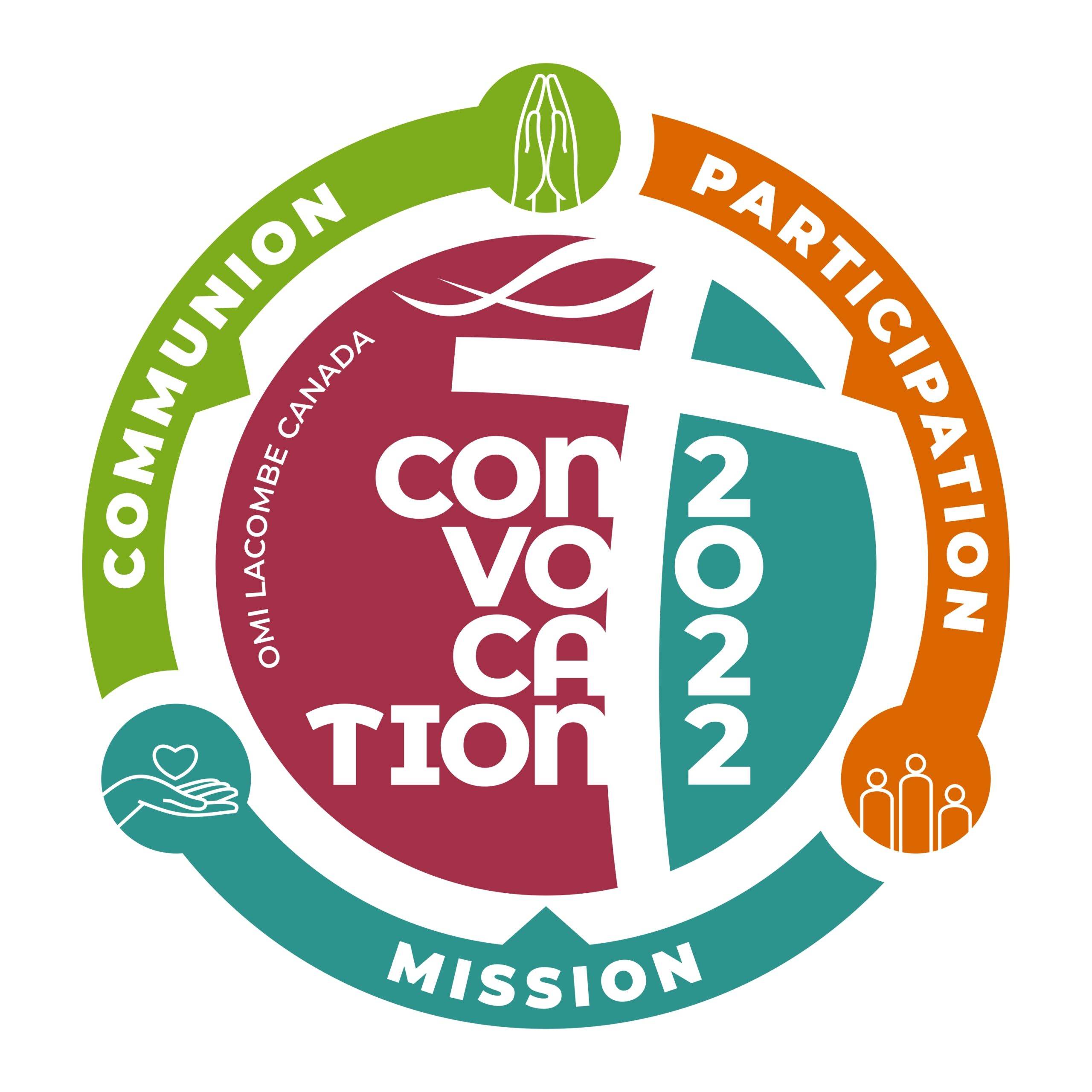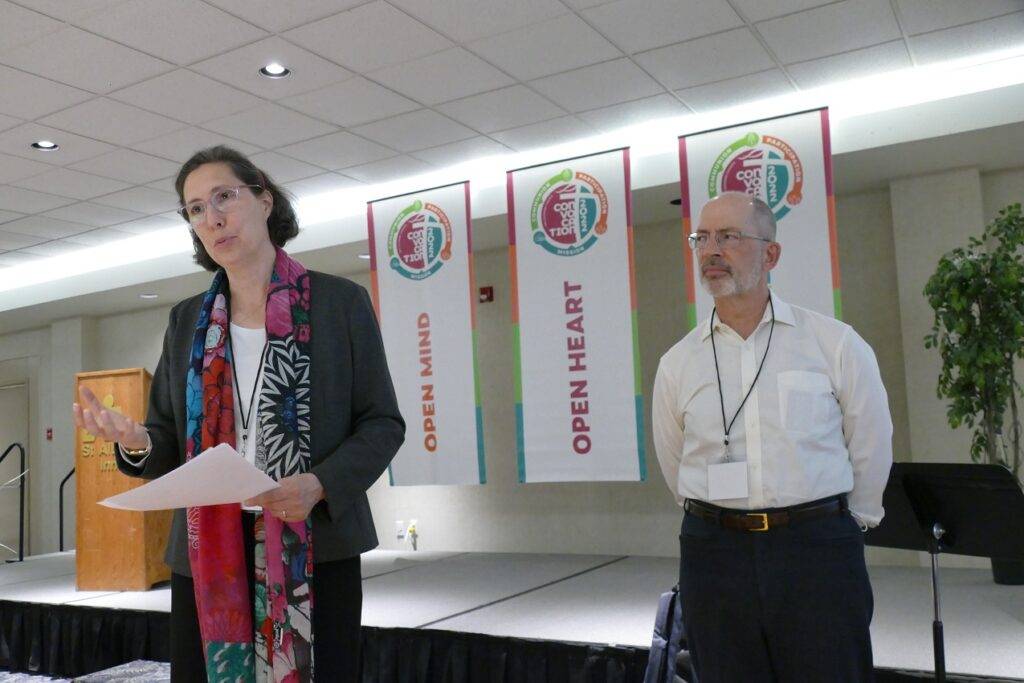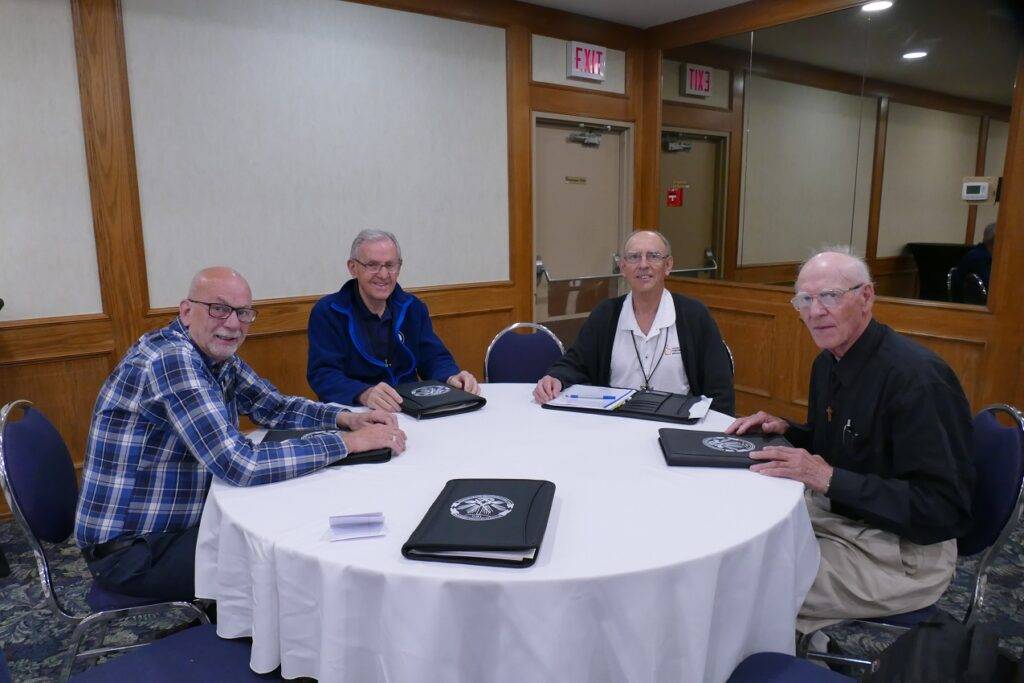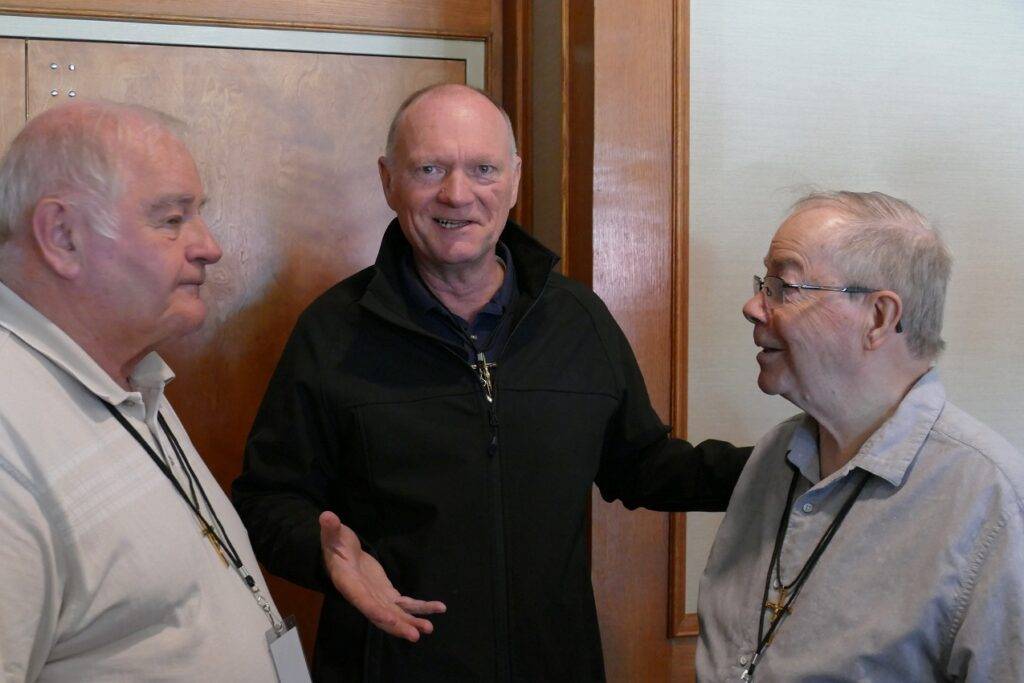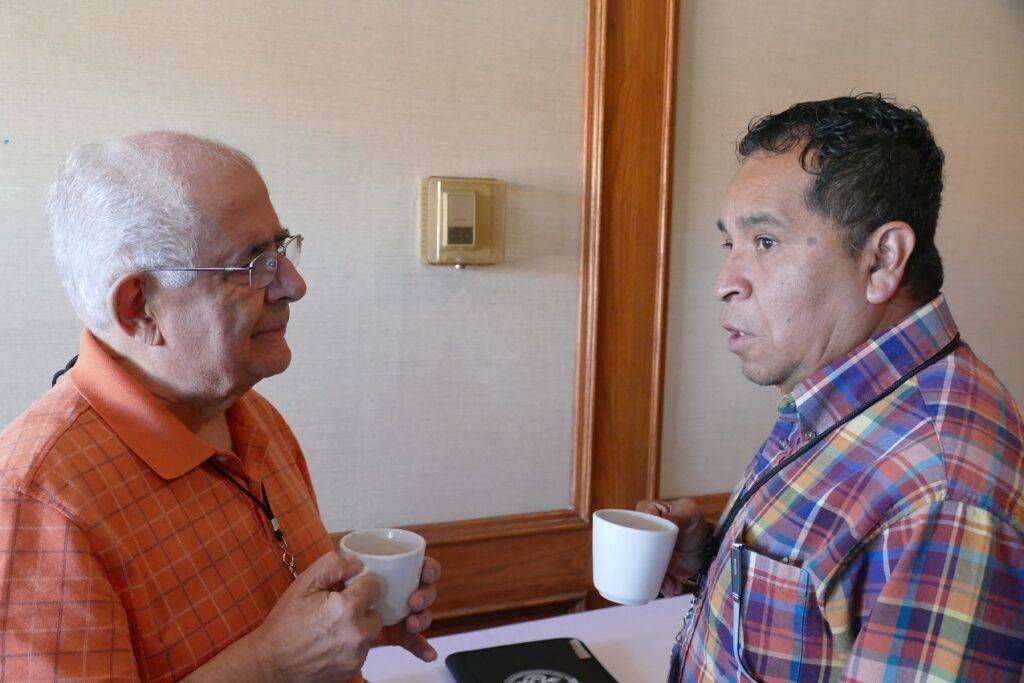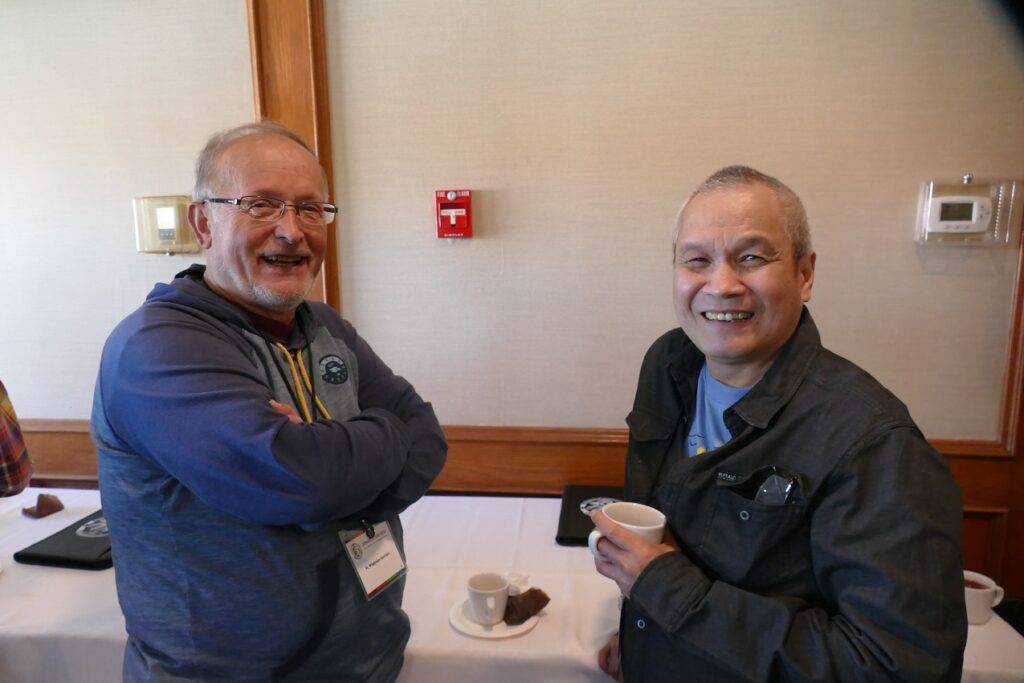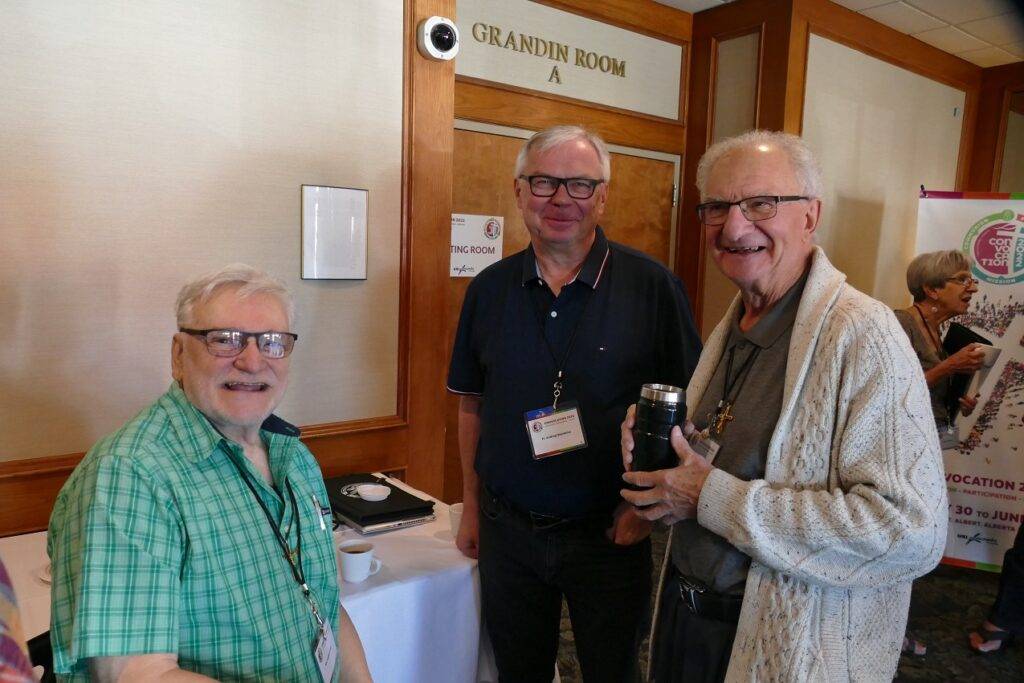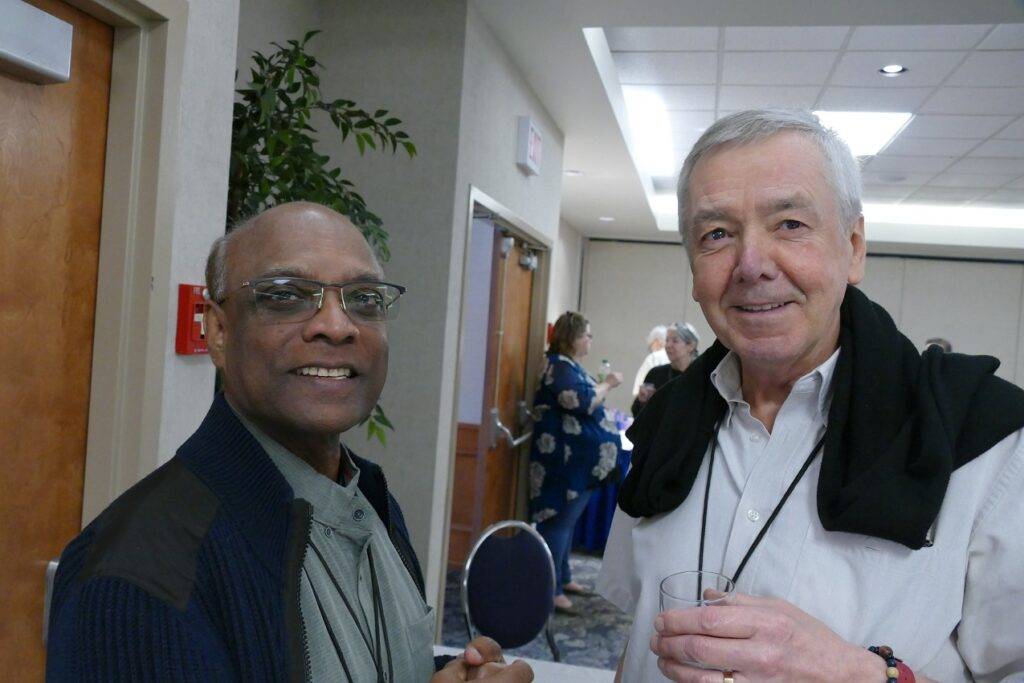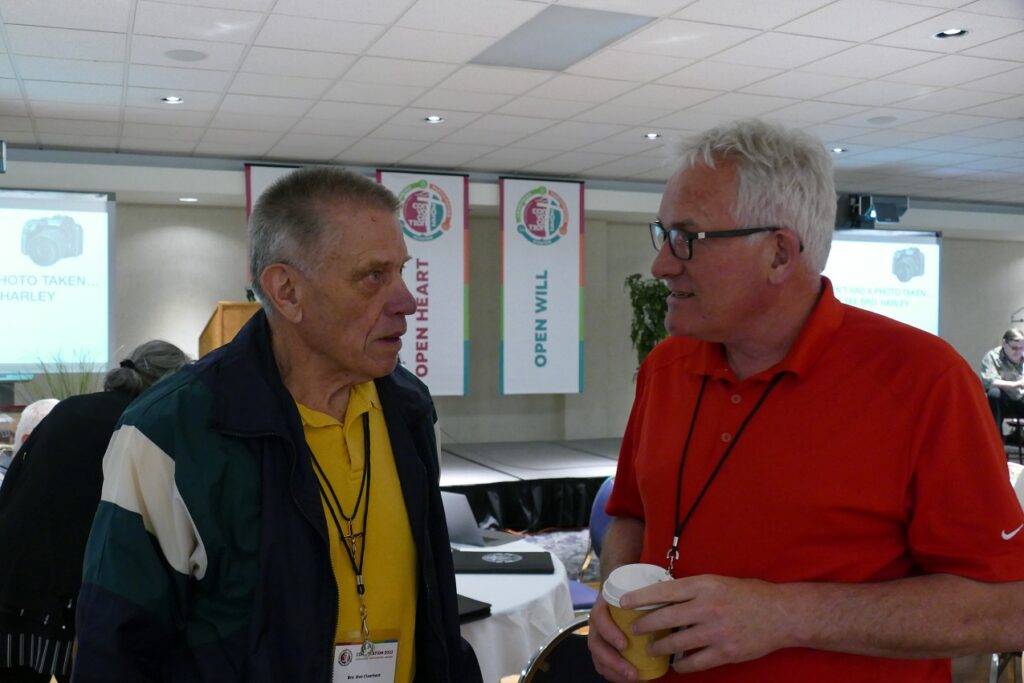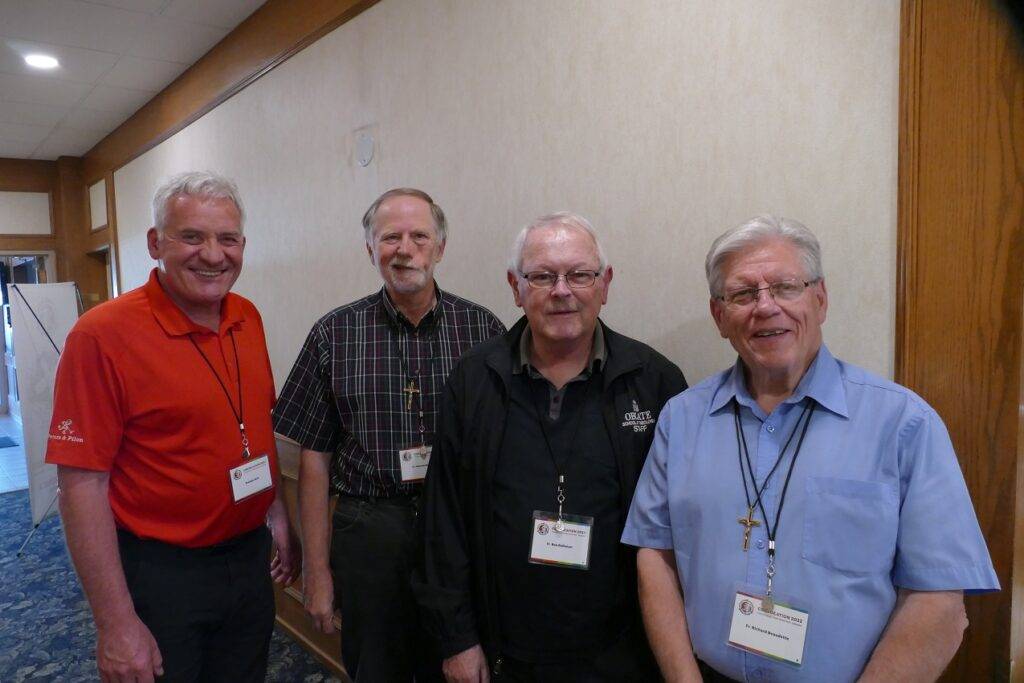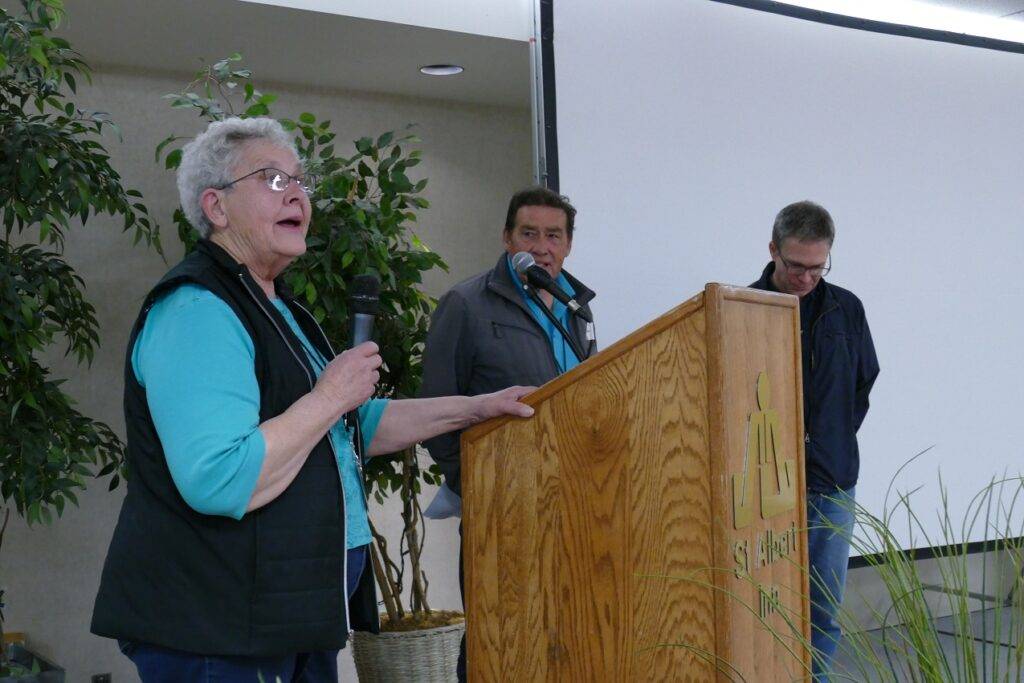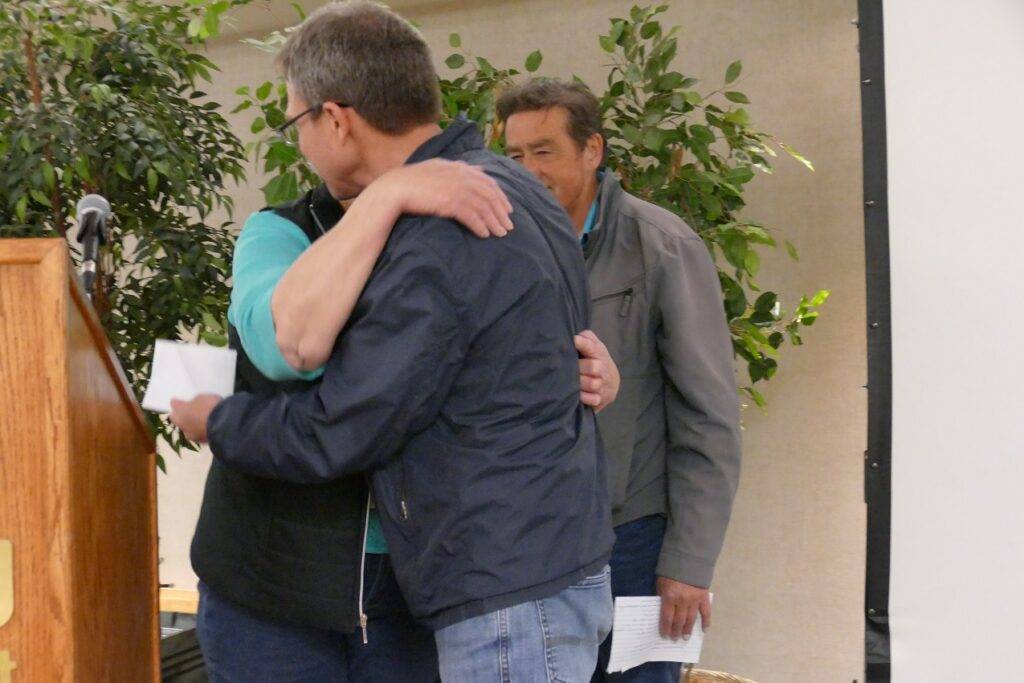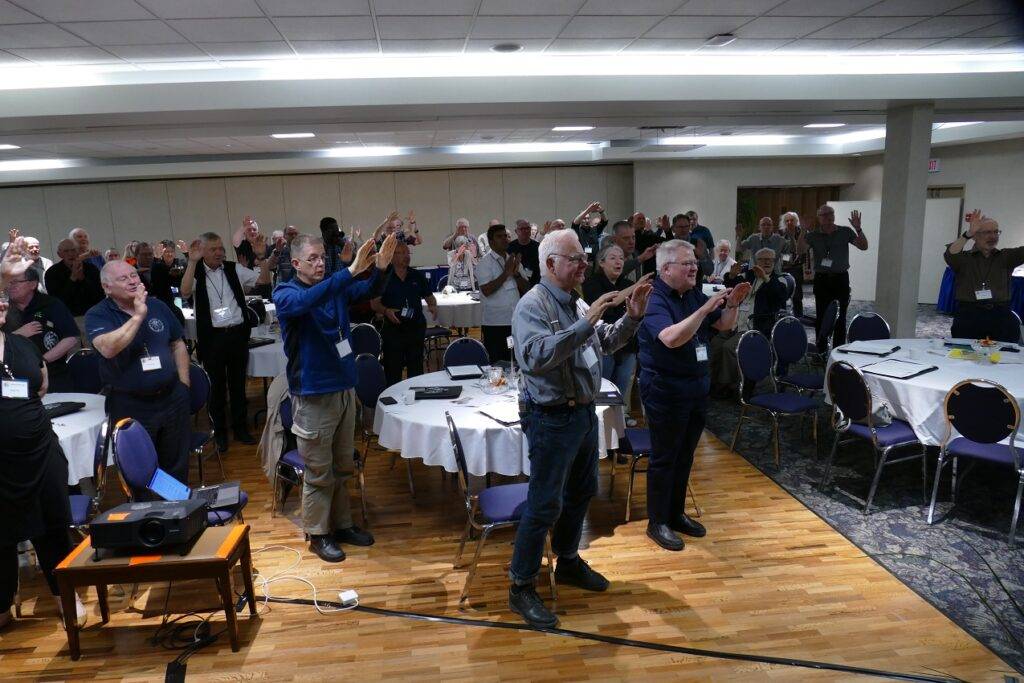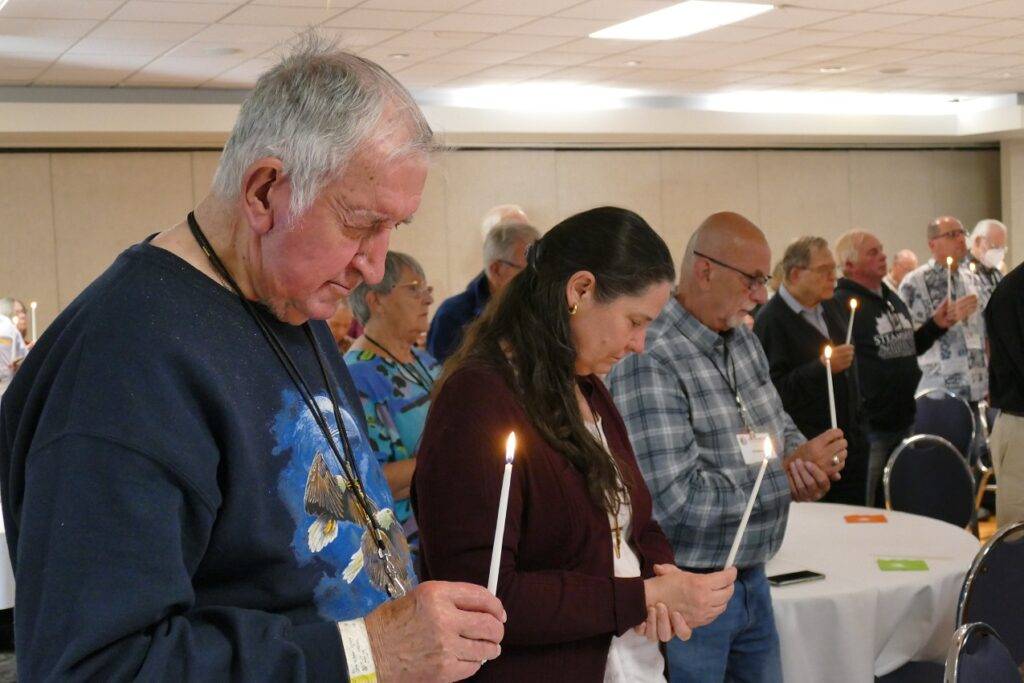Convocation – Communion, Participation, Mission
Day 2
Day 2 – What are our communal sins?
 In our small groups, we met and prayerfully discussed what we saw as being our communal failings; there were deep, meaningful discussions. Each group submitted their report to the Convocation facilitators, who compiled the responses. In presenting their summary, they remarked on how the various submissions came together in a few themes. First, we recognized our communal arrogance, which translated into colonization, clericalism, sexism, etc. Second, we became aware of our tendency to selfishness/individualism. Like the society we are wont to criticize, we, too, often fall into thinking in terms of my ministry, my money, my car, etc.
In our small groups, we met and prayerfully discussed what we saw as being our communal failings; there were deep, meaningful discussions. Each group submitted their report to the Convocation facilitators, who compiled the responses. In presenting their summary, they remarked on how the various submissions came together in a few themes. First, we recognized our communal arrogance, which translated into colonization, clericalism, sexism, etc. Second, we became aware of our tendency to selfishness/individualism. Like the society we are wont to criticize, we, too, often fall into thinking in terms of my ministry, my money, my car, etc.
After Laurence and Peter presented their summary, responses were welcomed from the floor. We heard responses such as:
“Going through these statements sets me free. We come from a history of denial; I don’t see that today.”
“I appreciate the conversation we had at our table and hearing the comments; it sounds like others had a very rich conversation as well. There is lots here that gives us food for thought. We are at a moment in our church when we are becoming increasingly aware of the need for this process in the church. The work ahead of us is significant individually and communally.”
“There is great strength in the OMI charism. Yesterday, people highlighted the charism as a strength, but somehow, despite a successful beginning, we ended up in a place where we didn’t want to be. What led us to this place? It started off well but ended up in a different place. St. Ignatius says that sometimes evil spirits take on the appearance of an angel of light. Sin closes us in on ourselves; it leads to a lack of critical self-evaluation and complacency.”
“When the evil one attacks us in our strengths, it is much harder to recognize. Often when people want to do the right thing, they often don’t consult the people with whom they are working and assume that they agree with us.”
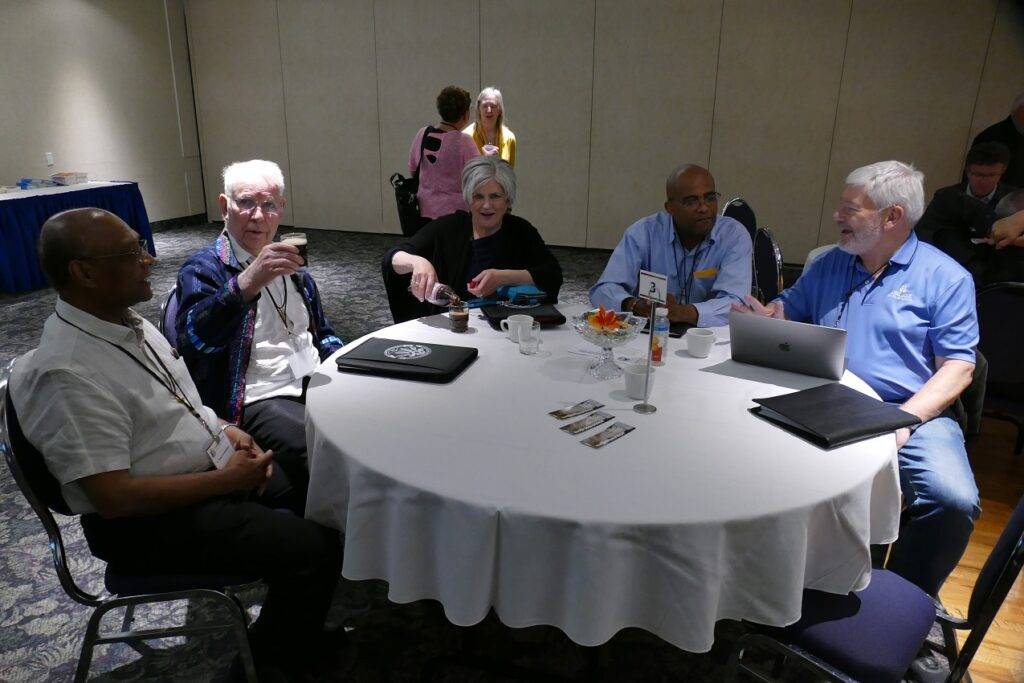
From left to right: Fr. Thomas A.P. Kurudeepan, Fr. Gerry LeStrat, Debbie Doornbos, Bro. Jean-Emmanuel Meloncourt and Fr. Tim Coonen.

From left to right: Fr. Ron Rolheiser, Adele Longstaff, David Sax, Jim Longstaff, Greg Dunwoody and Fr. John Malazdrewich.
In his spiritual exercises, St. Ignatius encourages the participant to pray for the grace of humiliation; from there, we can enter into humility. The grace of being able to recognize our sinfulness is what keeps us on the mark and keeps us from going down a path where we don’t question what we are doing.”
After participants had finished offering responses from the floor, Harry Lafond reflected on what he had heard. As on the previous day, he related our journey to his own community of Muskeg Lake. He spoke about the difficulty people have in expressing, authentically, “I love you” and the necessity of being in relationship with one another. The circle is key to the Indigenous understanding of creation. In a circle there is no hierarchy; we are all one before the Creator. This relationship to one another finds a concrete expression the round dance. Hands joined, the drum calls participants to move independently, yet in harmony, with one another. He said wryly, “If someone is out of rhythm, it doesn’t take long to notice.”
Break time
Day 2 – Session 2
Using the theme of “With Mary, putting out into the deep water…”, we were invited, in the context of prayer and cognizant of all that has been shared thus far, to reflect on where the Spirit is leading as OMI Lacombe Canada. Once again, we met in small groups, shared our reflections with the facilitators, and then met in the general assembly.
Key elements that surfaced were:
- A call to trust, surrender and to discernment. “The Lord calls us to prayer, discernment and action with deep trust in the gift of the Oblate charism for the world.” “To go out into deep water, to not be afraid, to leave everything to follow the Lord.”
- Grounded in our charism, to invent new paths, new ways and to do this through reconciliation … whatever we do, it must be based on what Indigenous people want from us.”
- Choose ministries, knowing our limits, that we can do well and not just in a “half fast” way.
- Looking beyond our parish walls, looking to our Associates (laity) and letting go.
Again, responses were invited from the floor.
“I support the idea of Indigenous people leading us through dialogue.”
“Archbishop of Edmonton keeps repeating a phrase: ‘nothing for us without us.’” We need to be led by Indigenous people.
“Often, our decisions are not about good versus bad but between good, better, best. This makes discernment difficult when it involves letting something go that is good, but we need to remember that it could be for something better.”
“Looking around the room at the ages of vowed Oblates and Associates … I don’t know what we can do. There is one thing we can do no matter what age or energy level we are at – we can choose to be in community. We made a good start with the founding of the Province twenty years ago, but it is time for a reboot. It has to happen at a very basic level … doing something such as praying the Liturgy of the Hours together. We have to do everything we can to revitalize community life. The energy to redirect into one Province can only come from a renewal of community life.”
“We are struggling in that we are still holding on tightly to what we have; I don’t believe we are being daring in cutting the fat, slimming down, getting back to the charism, the option for the poor, refocusing the energy we have on those pillars, letting go of the things we are caught in as a diocesan church – being pastors. If we are going to go forward as Oblates in Canada, we have to go back to what inspired the first Oblates who came to Canada. If we try to be missionary from within the walls of our church, it’s not going to happen. We put all our energy into the people in the pews. We are struggling with that here. We are holding on to the ways we have been doing things. We get back into the same rut over and over again. We can move into a different type of ministry, but we are going to have to struggle to let go of history, of junk. ‘Everything I ever let go of was covered in claw marks’”
“I’m thankful for the work everyone did in producing this document, but I’m even more thankful for the sense of hospitality for the Associates. There was a time when so many Associates in a meeting like this would have been unimaginable.”
“Often, the life of an individual bears more fruit after he/she dies than when alive. I hope that’s also true of the Oblates.”
“Our Associates are not afraid to speak about St. Eugene in a way that I, as an Oblate, hesitate to. Our Associates are on fire. It’s a call for our Province to promote and sustain the charism with our Associates.”
After participants finished sharing, we were invited to consider what was brought out in the group sharing in light of the seven orientations already developed in our Province process last year. We were invited to recognize the power that emerges when we start talking to one another. The Spirit is clearly with us. It’s not a matter of us doing great things, but rather doing things with great zeal.
In his reflections, Harry Lafond recognized the sense of diminishment we have and offered that rural Saskatchewan is undergoing a similar process. “It’s frighting in many small towns where you don’t hear the sound of children playing because there are none left. I can relate to some of the fear I hear as you share about the future.” Fear, however, he said is not a foundation on which to build a future.
What can we do with the resources we have left? Harry didn’t offer a startling new vision that left us scurrying out the room to implement; instead, he spoke, again from personal experience. Years ago, he said, Indian Affairs came up with a funding program for initiatives within the community. It sounded promising, but things didn’t change until one of the directors got the staff together and told them to get out from behind their desks and go out to be with the people. “Now, I see a change happening in the community as connections are made. I see the same thing with the church. About five percent of the Catholics in my community come to church. Where are the ninety-five percent? The church is out there, in those homes. If we are going to provide the ministry service required in our community, we have to get out of the building. We can meet with the five percent on Sunday because that’s what they are expecting, but the other ninety-five percent have expectations as well. If we don’t go out to the people, they aren’t going to come to us.”
With the afternoon session being “With Mary, putting out into the deep water…”, Harry took time to reflect on the role she plays within Indigenous Catholic sprituality. “Mary has always been a special part of spirituality in our communities. The rosary is spoken of by old people – a form of prayer that is an integral part of their family’s spirituality and culture. If you go to their home and offer to pray the rosary with them, they will bring you in and offer you tea to pray with them. Mary has a special place in the prayer life of people.”He ended his reflection on a note of hope: “The Oblates can continue to be part of our lives. In whatever way you reshape yourselves, you can be sure there are people out there ready for you. The old people in our communities are very forgiving people; they are more than willing to forgive. If we can learn to talk to each other, sit down, have tea, and learn about our differences, we can learn to heal.”
Afterwards, Ken Thorson, on behalf of the assembly expressed appreciation for Harry and Germaine’s presence and the immense contribution they had made to our gathering.
Our evening meal was followed by Eucharist, presided at by Fr. Ron Rolheiser, OMI.
By Harley Mapes, OMI


